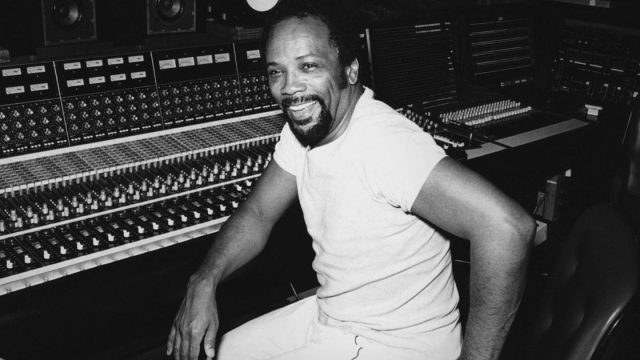Quincy Jones, Multi Grammy-Award Winning Musician & Producer, Dies At 91

Quincy Jones, the legendary, multi Grammy Award-winning music producer and composer, has died at the age of 91. He worked with Michael Jackson, Frank Sinatra, Ray Charles and many other artists.
His publicist, Arnold Robinson, confirmed Jones died at his Los Angeles home on Sunday, 3 November, surrounded by his family.
In a statement, his family said: “Tonight, with full but broken hearts, we must share the news of our father and brother Quincy Jones passing. “And although this is an incredible loss for our family, we celebrate the great life that he lived and know there will never be another like him.”
His family added that he was “truly one of a kind” who they would “miss dearly”.
“We take comfort and immense pride in knowing that the love and joy, that were the essence of his being, was shared with the world through all that he created,” they added. “Through his music and his boundless love, Quincy Jones’s heart will beat for eternity.”
Among his best-known credits was as the producer of Jackson’s historic Thriller album. He also oversaw the all-star recording of the 1985 charity record We Are The World and composed the soundtrack to the hit 1969 British film The Italian Job, starring Michael Caine.
Jones’ career, which spans more than 75 years, saw him achieve 28 Grammy award wins out of 80 nominations.
He was named one of the most influential jazz musicians of the 20th century by Time magazine. Lionel Richie, who co-wrote We Are The World and was among the charity single’s featured singers, called Jones “the master orchestrator”.
Quincy Jones ranked highly among the most versatile pop cultural figures of the 20th century, perhaps best known for producing the albums Off the Wall, Thriller and Bad for Michael Jackson in the 1980s, which made the singer the biggest pop star of all time. Jones also produced music for Frank Sinatra, Aretha Franklin, Donna Summer and many others.
He was also a successful composer of dozens of film scores, and had numerous chart hits under his own name. Jones was a bandleader in big band jazz, an arranger for jazz stars including Count Basie, and a multi-instrumentalist, most proficiently on trumpet and piano. His TV and film production company, founded in 1990, had major success with the sitcom The Fresh Prince of Bel-Air and other shows, and he continued to innovate well into his 80s, launching Qwest TV in 2017, an on-demand music TV service. Jones is third only to Beyoncé and Jay-Z for having the most Grammy award nominations of all time – 80 to their 88 each – and is the awards’ third most-garlanded winner, with 28.
Quincy Jones was born in Chicago in 1933. His introduction to music came through the walls of his childhood home from a piano played by a neighbour, which he started learning aged seven, and via his mother’s singing.
His parents divorced and he moved with his father to Washington state, where Jones learned drums and a host of brass instruments in his high-school band. At 14, he started playing in a band with a 16-year-old Ray Charles in Seattle clubs, once, in 1948, backing Billie Holiday. He studied music at Seattle University, transferring east to continue in Boston, and then moved to New York after being rehired by the jazz bandleader Lionel Hampton, with whom he had toured as a high-schooler (a band for which Malcolm X was a heroin dealer when they played in Detroit).
Jones toured Europe with Hampton, and spent much time there in the 1950s, including a period furthering his studies in Paris, where he met luminaries including Pablo Picasso, James Baldwin and Josephine Baker. At the age of 23, he also toured South America and the Middle East as Dizzy Gillespie’s musical director and arranger. He convened a crack team for his own big band, touring Europe as a way to test Free and Easy, a jazz musical, but the disastrous run left Jones, by his own admission, close to suicide and with $100,000 of debt.
He later secured a job at Mercury Records and slowly paid off the debt with plenty of work as a producer and arranger for artists including Ella Fitzgerald, Dinah Washington, Peggy Lee, Sarah Vaughan and Sammy Davis Jr. He also began scoring films, his credits eventually including The Italian Job, In the Heat of the Night, The Getaway and The Color Purple. (He produced the last of these, which was nominated for 11 Oscars, three for Jones himself.) In 1968, he became the first African American to be nominated for best original song at the Oscars, for The Eyes of Love from the film Banning (alongside songwriter Bob Russell); he had seven nominations in total. For TV, he scored programmes such as The Bill Cosby Show, Ironside and Roots.
He also produced four million-selling hits for the New York singer Lesley Gore in the mid-60s, including the US No 1 It’s My Party, and later embraced funk and disco, producing hit singles including George Benson’s Give Me the Night and Patti Austin and James Ingram’s Baby Come to Me, along with records by the band Rufus and Chaka Khan, and the Brothers Johnson. Jones also released his own funk material, scoring US Top 10 albums with Body Heat (1974) and The Dude (1981).

